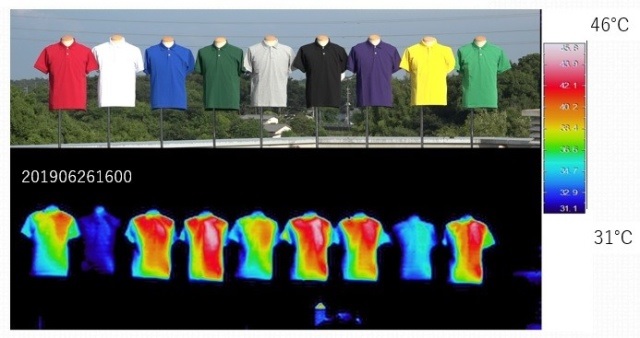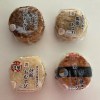
We all know white is cool and black is hot, but what about the colors in between?
Japan is, for the most part, a very safe country. There’s very little violent crime, and few aggressive or poisonous wild animals. There is, however, a potentially serious danger that it’s important to keep in mind at this time of year: heat stroke.
Summer is always hot and humid in Japan, and the last few days have been serious scorchers. Making the situation worse is that for most people living or traveling in Japan, any excursion outside involves plenty of walking, whether you’re making the whole trip to your destination on foot or hoofing it to the station to catch a train which you’ll later get off of before walking again to wherever it is you’re going.
So unless you can just stay inside with the A.C. blasting until mid-autumn, figuring out ways to mitigate the risk of heat exhaustion is critical, and that includes dressing appropriately. Researcher Toshiaki Ichinose, from Japan’s National Institute for Environmental Studies, conducted an experiment to see what color of clothing will keep your body the coolest in the summer sun. Now, it’s pretty common knowledge that white is the coolest and black the hottest, but unless you’re a mime odds are you don’t have an entirely black-and-white wardrobe, so what’s the order of the shades in between?
Before we get to the results, a quick refresher for everyone who’s forgotten junior high science class (or, for you precocious elementary schoolers who read SoraNews24, a sneak peak of what’s to come). We perceive objects as being different colors depending on what wavelengths of light they reflect and absorb. Objects we see as white reflect almost all wavelengths of light, and their heat energy along with them. On the other end of the scale, things we see as black absorb light of just about every wavelength, and its heat too.
For the experiment Ichinose set nine mannequin torsos out in the Japanese summer sun, each clad in a different colored polo shirt, then after five minutes of exposure checked the fabrics’ surface temperatures.
▼ The shirts used in the experiment
As expected, the white shirt was the coolest, with a temperature of approximately 30 degrees Celsius (86 degrees Fahrenheit), more or less the same as the air temperature during the test, followed by yellow. The next coolest shirts, in order, were gray and red, the latter a surprise since red is generally though of as a “hot” color in terms of psychological effect.
Purple ended up right in the middle of the pack, with the next, blue, again being somewhat unexpected, since in visual design it’s considered a “cool” color. Next came green, then dark green, and, finally, black, with the last two both having surface temperatures of over 50 degrees Celsius (122 Fahrenheit), more than 50 percent hotter than the white shirt.
Though the experiment was conducted in June of 2019, the fundamental laws of science still apply, and with late-summer temperatures often hitting daytime highs of 35 degrees or more in Tokyo, it’s even more important to look for any and all ways to stay cool.
Source: Weather News via Yahoo! Japan News, National Institute for Environmental Studies
Top image: Pakutaso
Insert images: National Institute for Environmental Studies
● Want to hear about SoraNews24’s latest articles as soon as they’re published? Follow us on Facebook and Twitter!


 This is the best summer in years to visit Japan…if you hate mosquitoes
This is the best summer in years to visit Japan…if you hate mosquitoes Japanese clothing companies adopt fifth “Intense Heat” season because summer is too long
Japanese clothing companies adopt fifth “Intense Heat” season because summer is too long Summer in Japan doesn’t feel like a Japanese summer this year, many are saying
Summer in Japan doesn’t feel like a Japanese summer this year, many are saying Cat paw parasol keeps you cool, changes color to remind you to put on sunscreen
Cat paw parasol keeps you cool, changes color to remind you to put on sunscreen Japanese TV issues heatstroke alert, says to avoid exercise, keeps showing high school baseball game
Japanese TV issues heatstroke alert, says to avoid exercise, keeps showing high school baseball game Starbucks Japan releases first-ever Hinamatsuri Girls’ Day Frappuccino
Starbucks Japan releases first-ever Hinamatsuri Girls’ Day Frappuccino Japan Extreme Budget Travel! A trip from Tokyo to Izumo for just 30,000 yen [Part 1]
Japan Extreme Budget Travel! A trip from Tokyo to Izumo for just 30,000 yen [Part 1] Japanese drugstore sells onigiri at pre-stupid era prices, but how do they compare to 7-Eleven?
Japanese drugstore sells onigiri at pre-stupid era prices, but how do they compare to 7-Eleven? Japan Extreme Budget Travel! A trip from Tokyo to Izumo for just 30,000 yen [Part 2]
Japan Extreme Budget Travel! A trip from Tokyo to Izumo for just 30,000 yen [Part 2] Japan has only one airport named after a samurai, so let’s check out Kochi Ryoma【Photos】
Japan has only one airport named after a samurai, so let’s check out Kochi Ryoma【Photos】 Should you warm up your convenience store onigiri rice balls in the microwave?【Taste test】
Should you warm up your convenience store onigiri rice balls in the microwave?【Taste test】 Is Sapporio’s Snow Festival awesome enough to be worth visiting even if you hate the snow? [Pics]
Is Sapporio’s Snow Festival awesome enough to be worth visiting even if you hate the snow? [Pics] What’s the best way to spend 1,000 yen at Denny’s in Japan?
What’s the best way to spend 1,000 yen at Denny’s in Japan? 7-Eleven Japan’s sakura sweets season is underway right now!
7-Eleven Japan’s sakura sweets season is underway right now! Tokyo Station staff share their top 10 favorite ekiben
Tokyo Station staff share their top 10 favorite ekiben The 10 most annoying things foreign tourists do on Japanese trains, according to locals
The 10 most annoying things foreign tourists do on Japanese trains, according to locals Highest Starbucks in Japan set to open this spring in the Tokyo sky
Highest Starbucks in Japan set to open this spring in the Tokyo sky Tokyo Skytree turns pink for the cherry blossom season
Tokyo Skytree turns pink for the cherry blossom season Starbucks Japan releases new sakura goods and drinkware for cherry blossom season 2026
Starbucks Japan releases new sakura goods and drinkware for cherry blossom season 2026 Japan’s new “Cunte” contact lenses aren’t pronounced like you’re probably thinking they are
Japan’s new “Cunte” contact lenses aren’t pronounced like you’re probably thinking they are Shibuya Station’s Hachiko Gate and Yamanote Line stairway locations change next month
Shibuya Station’s Hachiko Gate and Yamanote Line stairway locations change next month Yakuzen ramen restaurant in Tokyo is very different to a yakuza ramen restaurant
Yakuzen ramen restaurant in Tokyo is very different to a yakuza ramen restaurant Starbucks Japan adds new sakura Frappuccino and cherry blossom drinks to the menu
Starbucks Japan adds new sakura Frappuccino and cherry blossom drinks to the menu Japan just had its first same-month foreign tourist decrease in four years
Japan just had its first same-month foreign tourist decrease in four years Burning through cash just to throw things away tops list of headaches when moving house in Japan
Burning through cash just to throw things away tops list of headaches when moving house in Japan Japan’s newest Shinkansen has no seats…or passengers [Video]
Japan’s newest Shinkansen has no seats…or passengers [Video] Foreigners accounting for over 80 percent of off-course skiers needing rescue in Japan’s Hokkaido
Foreigners accounting for over 80 percent of off-course skiers needing rescue in Japan’s Hokkaido Super-salty pizza sends six kids to the hospital in Japan, linguistics blamed
Super-salty pizza sends six kids to the hospital in Japan, linguistics blamed Starbucks Japan unveils new sakura Frappuccino for cherry blossom season 2026
Starbucks Japan unveils new sakura Frappuccino for cherry blossom season 2026 Foreign tourists in Japan will get free Shinkansen tickets to promote regional tourism
Foreign tourists in Japan will get free Shinkansen tickets to promote regional tourism Take a trip to Japan’s Dododo Land, the most irritating place on Earth
Take a trip to Japan’s Dododo Land, the most irritating place on Earth Naruto and Converse team up for new line of shinobi sneakers[Photos]
Naruto and Converse team up for new line of shinobi sneakers[Photos] Is China’s don’t-go-to-Japan warning affecting the lines at a popular Tokyo gyukatsu restaurant?
Is China’s don’t-go-to-Japan warning affecting the lines at a popular Tokyo gyukatsu restaurant? Survey asks foreign tourists what bothered them in Japan, more than half gave same answer
Survey asks foreign tourists what bothered them in Japan, more than half gave same answer Japan’s human washing machines will go on sale to general public, demos to be held in Tokyo
Japan’s human washing machines will go on sale to general public, demos to be held in Tokyo Starbucks Japan releases new drinkware and goods for Valentine’s Day
Starbucks Japan releases new drinkware and goods for Valentine’s Day We deeply regret going into this tunnel on our walk in the mountains of Japan
We deeply regret going into this tunnel on our walk in the mountains of Japan Studio Ghibli releases Kodama forest spirits from Princess Mononoke to light up your home
Studio Ghibli releases Kodama forest spirits from Princess Mononoke to light up your home Major Japanese hotel chain says reservations via overseas booking sites may not be valid
Major Japanese hotel chain says reservations via overseas booking sites may not be valid Put sesame oil in your coffee? Japanese maker says it’s the best way to start your day【Taste test】
Put sesame oil in your coffee? Japanese maker says it’s the best way to start your day【Taste test】 No more using real katana for tourism activities, Japan’s National Police Agency says
No more using real katana for tourism activities, Japan’s National Police Agency says What happens when you seek refuge from the summer heat at Ikea in Shinjuku
What happens when you seek refuge from the summer heat at Ikea in Shinjuku Sailor Moon yukata kimono line will keep you breezy and beautiful in the Japanese summer heat
Sailor Moon yukata kimono line will keep you breezy and beautiful in the Japanese summer heat We cook a monjayaki Japanese pancake on the hood of a car during Japan’s hottest summer ever【Vid】
We cook a monjayaki Japanese pancake on the hood of a car during Japan’s hottest summer ever【Vid】 10 tips to help you survive the Japanese summer
10 tips to help you survive the Japanese summer Japanese YouTuber shows how hard it is to hide your panties under sheer clothing
Japanese YouTuber shows how hard it is to hide your panties under sheer clothing W.T.F. Japan: Top 5 odd ways Japanese people beat the summer heat【Weird Top Five】
W.T.F. Japan: Top 5 odd ways Japanese people beat the summer heat【Weird Top Five】